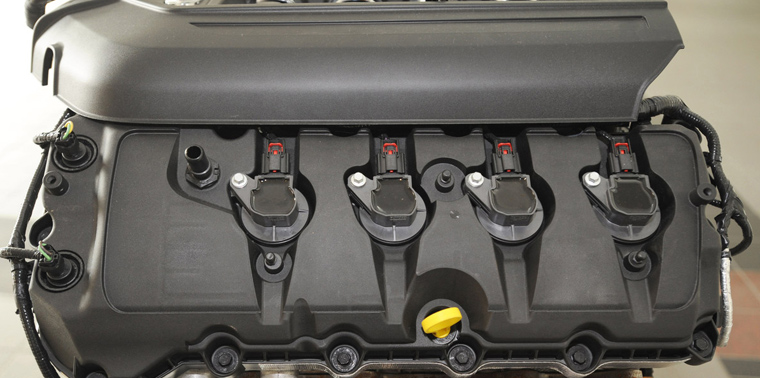February 4, 2013 — It’s a standard American refresh for the home or office: Rip out the old, stained carpet and replace it with sparkling, soft wall-to-wall.
But gracing our spaces in this way exacts an ugly environmental toll. In 2011, more than 3.8 billion pounds of used carpet was discarded in the United States (down from nearly 5 billion pounds before the housing market collapsed), according to the Carpet America Recovery Effort, an industry-supported nonprofit organization.
Most of that waste ends up in landfills. Some of those old carpets, however, are ending up in an unexpected new home: the engines of Ford vehicles. Wellman Engineering Resins, a Johnsonville, S.C., plastics company, has developed a technique to harvest the plastic resins from old carpets. Ford, in turn, is using these recycled plastics, sold under the brand name EcoLon, to manufacture parts, including cylinder head covers used in the Ford Fusion, Escape, Mustang and F-150 trucks.
Carpet is heavy, and since construction “tipping fees” for dumping at landfills typically run by the pound, contractors are happy to unload their carpet debris at one of several collection points Wellman has set up along the East Coast. What Wellman then does to transform the carpet to its raw components is a closely guarded trade secret—but quality coordinator Alton Boyd says it involves a mechanical separation, not a chemical process. “We grind it, and it goes through several processes to clean it,” says Boyd. “In the end, we extrude it into a chip that we use to make the resin that’s a component in the plastic parts.” A second manufacturer uses the EcoLon to build the auto parts for Ford.
EcoLon accounted for over 4 million pounds of recycled carpet in 2010.
Though such technology has been around since the mid-1990s, according to Don Wingard, the recycling technology director at Wellman, it’s taken the intervening decades for the process to make economic sense. “It’s good to recycle,” says Wingard, “but it has to be cost effective.” Collecting, transporting and processing old carpets is “very energy and labor intensive,” he explains.
As purer forms of plastic have become scarcer, however, demand for recycled alternatives has grown. “Finding alternative sources for materials is becoming imperative as petroleum prices continue to rise and traditional, less sustainable materials become more expensive,” explains John Viera, Ford’s global director of sustainability and vehicle environmental matters.
Carpet-to-car-part recycling is only one of many efforts to divert used carpeting from landfills. According to CARE’s annual report, recycling has grown from 55 million pounds in 2002 to 251 million pounds in 2011. According to Ford press materials, EcoLon accounted for just over 4 million pounds of recycled carpet in 2010.
Still, while the growth in carpet recycling is impressive, less than 10 percent of the nation’s used carpets are recycled, and CARE projects that percentage to grow slowly, reaching just 12 percent by 2016. “The amount we’re using is nowhere near what’s getting thrown out,” says Boyd. “It’s not a question of supply, but of logistics—of getting it where we can use it.”
These logistics are daunting. Yet the effort makes environmental sense, according to Allen Hershkowitz, senior scientist at the Natural Resources Defense Council. “Just for context, in this country we produce between 14 and 16 billion tons of waste every year,” he says. “There is no one single undertaking we could carry out that’s going to address that ecological issue. It’s going to be addressed by millions of businesses and people.”
After 35 years of researching and implementing solutions to our solid waste problems, Hershkowitz believes recycled products like EcoLon are vital. “It makes no sense to take virgin oil from ecologically irreplaceable regions, make it into plastic and throw it away, when it can instead be recycled over and over again,” he says. “It makes no sense to put highly refined materials into the landfill when they can be recycled and avoid the upstream ecological costs of refining crude oil and manufacturing plastics.”
In light of these factors—and in a world of increasing oil scarcity—recycling efforts like those being made by Wellman and Ford will become ever more important, and sweeping the vital role of plastic reclamation under the carpet will become increasingly difficult.
Ensia shares solutions-focused stories free of charge through our online magazine and partner media. That means audiences around the world have ready access to stories that can — and do — help them shape a better future. If you value our work, please show your support today.
Yes, I'll support Ensia!
